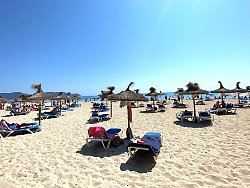Friday 23 July 2021
High incidence area Spain
Travel industry worries about summer business
In view of the sharply increasing corona numbers, the federal government classifies Spain as a high incidence area. This does not mean a travel ban, but a number of travel providers fear growing uncertainty among customers.
After the start of the important summer travel business, the tourism industry, which was hard hit by the Corona crisis, comes under pressure again. The federal government has classified the popular holiday destination Spain from Tuesday (July 27th) as a high incidence area. This was announced by the Robert Koch Institute. The decision does not mean a travel ban. Anyone who has not been fully vaccinated or has recovered must be in quarantine for at least five days after returning to Germany. The Netherlands are also classified in this way.
Some organizers reported growing uncertainty among customers and cancellation requests. The most obvious was the German Travel Association (DRV). The decision “destroys the vacation plans of numerous travelers and especially many families with children in the middle of the holiday season”, criticized industry president Norbert Fiebig. “An impending quarantine leads to great uncertainty among people who are currently on vacation or who are about to start their vacation.” Fiebig demanded: “We have to move away from the pure incidence analysis when classifying target areas.” Instead, the actual regional risk situation for travelers and the specific burden on the health system should be the focus of considerations. This must be taken into account in the adjustment of the Corona entry regulation, which is necessary anyway.
Representatives of major organizers also expressed their disappointment. “The upgrading of Spain as a high incidence area unsettles many holidaymakers, and we therefore have a lot of inquiries in our service center, including cancellation inquiries,” said Ingo Burmester, Central Europe boss at DER Touristik. Germany’s second largest travel company is now offering holidaymakers to Spain the option of canceling or rebooking free of charge when they leave for the next two weeks. At the same time, DER emphasized: “A travel warning is not a travel ban.” Guests could start their vacation anyway.
“Travel to Spain is still safe”
Tui said they were sticking to the offer in Spain – “especially because the majority of the guests have now been vaccinated and no further conditions are planned after arriving in Germany”. If you are still thinking about a rebooking or a refund, you can contact the travel agency or the TUI service. “Travel to Spain is still safe,” is the opinion of the Hanoverians. “It is important that you adhere to the rules of distance and hygiene on vacation as well as at home. Then nothing stands in the way of a relaxed vacation.”
The provider FTI does not expect a wave of cancellations, but “some rebooking for guests who have not yet been vaccinated or recovered”. When asked, boss Ralph Schiller said that the Berlin decision probably meant a setback for the so important tourism in the Mediterranean country. “Whether there will be another comeback for Spain before the end of the summer season remains to be seen.”
Spain is the most popular foreign travel destination for Germans – especially Mallorca. Tourism companies on the Balearic Island are worried about the rest of the summer season. “I’m shocked,” said Beatrice Ciccardini, landlady of the restaurant “Zur Krone” at Ballermann. “I wasn’t expecting this after we did so well with incidences initially,” she said. She herself booked a trip to Germany with her son, which she will now cancel because otherwise he would have to be in quarantine. The decision of the federal government was probably inevitable, says the landlady with resignation.
Tremendous economic importance
The Habtur holiday home rental association is also seeing black for the time being. “That is very bad news. We were hoping for a good season because the fincas are currently the most popular holiday option,” said Maria Gilbert from Habtur. Now there will certainly be cancellations, as nobody wants to risk the quarantine. “It is uncertain what will happen next.”
The summer travel business is of enormous economic importance for tour operators and travel agencies. Anyone who returns to Germany from a high-incidence area and is not fully immunized has to be in quarantine for ten days, but can shorten this with a negative test after five days. The DRV estimates that around 200,000 package travelers from Germany are currently vacationing in Spain, 60 percent of them in the Balearic Islands. In addition, there are around 200,000 individual tourists.
.
